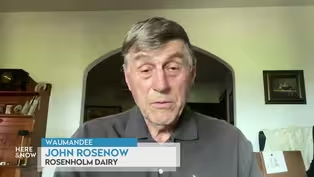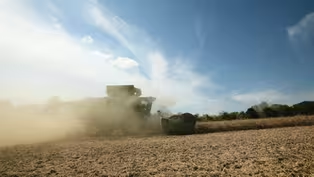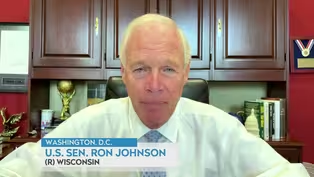Here and Now
Sydney Timmer-Murillo on Public Violence and Shared Trauma
Clip: Season 2400 Episode 2413 | 5m 32sVideo has Closed Captions
Sydney Timmer-Murillo on how mass shootings and assassinations affect mental health.
Medical College of Wisconsin professor and clinical psychologist Sydney Timmer-Murillo considers how exposure to mass shootings and assassinations affect mental health and generate anxiety and trauma.
Problems playing video? | Closed Captioning Feedback
Problems playing video? | Closed Captioning Feedback
Here and Now is a local public television program presented by PBS Wisconsin
Here and Now
Sydney Timmer-Murillo on Public Violence and Shared Trauma
Clip: Season 2400 Episode 2413 | 5m 32sVideo has Closed Captions
Medical College of Wisconsin professor and clinical psychologist Sydney Timmer-Murillo considers how exposure to mass shootings and assassinations affect mental health and generate anxiety and trauma.
Problems playing video? | Closed Captioning Feedback
How to Watch Here and Now
Here and Now is available to stream on pbs.org and the free PBS App, available on iPhone, Apple TV, Android TV, Android smartphones, Amazon Fire TV, Amazon Fire Tablet, Roku, Samsung Smart TV, and Vizio.
Providing Support for PBS.org
Learn Moreabout PBS online sponsorshipChris Taylor.
The court currently has a 4 to 3 Liberal majority.
The world is an increasingly scary place.
Political assassinations, mass shootings at schools, churches and on the street.
Even though some of the violence is close to home, the sense is it won't happen to me.
But that's what survivors often say.
And how are people to make their way in the face of it?
We ask Sidney Timmer-Murillo, assistant professor at the Medical College of Wisconsin and psychologist treating trauma and traumatic injury.
And thanks for being here.
>> Thank you.
>> So is there such a thing as collective trauma, where people generally feel a sense of foreboding in the current climate?
>> Yeah, absolutely.
I think especially with the frequency that we're seeing violence and such highly broadcasted events of violence, we can absolutely, as humans feel the weight of so much profound trauma.
>> So watching the the deadly mayhem of the fire and church shooting in Michigan was so much.
And then it's on endless loop in social media.
How much does that endless loop wear on people?
>> Yeah, we know that the frequency of how much you see trauma or experience trauma, so that repetition of violence really can impact somebody quite significantly.
And it's normal for them to then start to experience anxiety or fear or really a threat to their sense of safety.
Even if it wasn't you who experienced the violence per se.
>> How injurious is this exposure in people's day to day lives, perhaps especially children and young adults, things they >> Yeah.
>> So, you know, everybody is different.
We can see a range of different reactions from an understandable spike in your emotion when you first see that violent event, but it can grow and really build a cascade into mental health concerns or mental health diagnoses.
And so an individual, you know, especially kids and children and adults, when they're trying to make sense of it, it can really start to shape your worldview.
And whether or not you feel safe operating in the world.
So maybe you start to avoid certain things that used to be normal for you.
It might be difficult for you to go to work or go to school.
>> And so the shock of assassinations and school shootings is is obviously so deeply disturbing.
Should people not directly involved sit with that or move along?
>> Yeah, we would encourage that.
You know, you can't necessarily always escape the bad things happening in life or, or media and you want to be informed, but it's definitely important to take breaks.
I would argue that, you know, taking those social media breaks and really making sure you're engaged with your day to day life, your loved ones and family can really keep you grounded when navigating so much tension in this world.
>> How does trauma affect people who have experienced it?
>> What we know from the research is that if you have a history of trauma that puts you at greater risk of developing psychopathology after any subsequent types of trauma.
And so if you, let's say, even we're in like a motor vehicle collision, and then now you're dealing with new exposures to violence, it does tend to put you at a greater risk.
Or it's something that I would be looking out for when I'm trying to help treat somebody for, let's say, post-traumatic stress disorder or depression.
>> So it really.
>> In what feels like a violent world and is is the practice of trauma treatment a growing field?
>> Absolutely.
Yeah.
I think, you know, a majority of people will experience at least one trauma in their lifetime.
But we know that a lot of people can are at risk for more than just one traumatic experience, or they live in communities with high rates of violence.
And so because of that, you know, I think mental health providers really do need to be prepared for addressing trauma in whatever they're doing with their patients.
But we are definitely growing in terms of specializations as well, that we need these providers to really be able to hone in on the root of somebody's trauma reactions, and that tends to need some pretty specialized treatment to to be able to do that effectively.
>> What makes someone resilient to trauma?
>> Yeah.
You know, I think it is important to remember that there is resilience in the face of trauma.
And there are so many things that can contribute to that.
There can be individual factors.
So how you regulate your emotions in the face of fear and threat to your safety.
But I also think social support is such a profoundly important resilience factor, really connecting to your loved ones.
When you have been exposed to violence, it's so critical for trying to move forward and cope with move forward and cope with
Here & Now opening for October 3, 2025
Video has Closed Captions
Clip: S2400 Ep2413 | 1m 3s | The introduction to the October 3, 2025 episode of Here & Now. (1m 3s)
Hughes and Lazar Enter 2026 Governor and Supreme Court Races
Video has Closed Captions
Clip: S2400 Ep2413 | 38s | Missy Hughes and Maria Lazar announce 2026 runs for governor and Wisconsin Supreme Court. (38s)
John Rosenow on Dairy Workers and Immigration Enforcement
Video has Closed Captions
Clip: S2400 Ep2413 | 5m 56s | John Rosenow on reliance of dairy farms on immigrant labor and the prospect of raids. (5m 56s)
Tariffs, Trade War and Woes for Wisconsin's Soybean Farmers
Video has Closed Captions
Clip: S2400 Ep2413 | 5m 55s | Wisconsin soybean farmers are enjoying a bumper crop but are in the middle of a trade war. (5m 55s)
US Sen. Ron Johnson on 2025 Government Shutdown Politics
Clip: S2400 Ep2413 | 5m 28s | Ron Johnson on the federal government shutdown and his proposed Eliminate Shutdowns Act. (5m 28s)
Providing Support for PBS.org
Learn Moreabout PBS online sponsorship
- News and Public Affairs

Top journalists deliver compelling original analysis of the hour's headlines.

- News and Public Affairs

FRONTLINE is investigative journalism that questions, explains and changes our world.












Support for PBS provided by:
Here and Now is a local public television program presented by PBS Wisconsin




